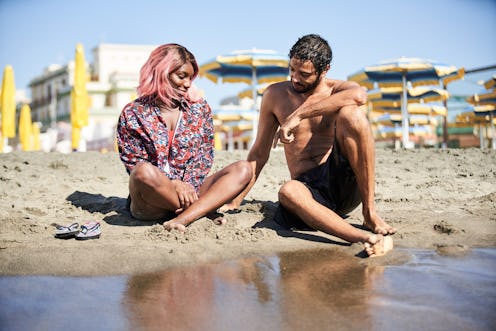TV & Movies
Neither Justice Nor Italian Pseudo-Boyfriends Can Save Arabella On I May Destroy You
With her case officially closed, Arabella is forced to confront the fact that neither she nor the police have progressed at all.

Arabella has spent the nine months since she reported her sexual assault to the London Metropolitan Police exploring various ways to put herself back together. She's tried handicrafts and working out and support groups; she's tried pursuing men and she's tried taking a break from them; she's tried writing about her experience and she's tried avoiding it by finding other ways to make money. But in the meantime, in the background, there was the implicit understanding that her case was making its laborious way through the UK justice system. Last she heard, police had a suspect and were performing a DNA analysis. But in the most recent episode of I May Destroy You, Arabella learns that investigators have now cleared their only suspect and the trail for her assailant is officially cold. The news is crushing to Arabella, who seems to have believed if she just focused on restoring herself, the police would exact retributive justice. With her case now closed, Arabella is forced to confront the fact that, nine months after her assault, neither she nor the London Met have made much progress at all.
Reeling — and with the generosity of her best friend Terry to fund a plane ticket — Arabella takes off for the last place she was happy: Ostia, Italy. It’s almost as if she hopes the magic of air travel can turn back the clock to the last day she spent on her writer's retreat, which also happens to be the last day before her assault. Uninvited and unannounced, she turns up at the apartment of Biagio, the drug dealer and former fling she fantasizes into a boyfriend. He isn’t her boyfriend, though. In fact, one of the last times they spoke, he was apoplectic at having to submit his own DNA to the police to aid her investigation.
She uses the spare key Biagio hides outside his apartment and waits for him to get home. She’s seeking an affirming experience with a man she knows. Biagio, though, is understandably stunned to see her. When she refuses to leave, kicking and screaming at the door he’s shut in her face, he approaches her with a gun. He doesn't aim it Arabella, but the message is clear: This relationship — whatever it was — is over. You do not have a say. You do not have a right to your own gilded memory of it.
For the audience, it's more shocking than unexpected. Terry is always inconveniently reminding Bella that the object of her affection is a criminal and a hypocrite. He may lecture Arabella on how to stay safe at the bar, for example, but once she's found herself in danger, he’s hardly there for her as a support. That the audience doesn't predict the threat of violence shows how seduced we've been by Arabella's perception and her longing for a place and, yes, a man where she last felt like her whole and confident self. For Arabella, it's another institution decimated. She does not believe in the police to avenge her; now, she does not believe in her own judgment, either.
The reality of Biagio has always been more complicated than Arabella wanted to admit. He was adamant he wouldn't visit her in London, but vague about the suggestion of her coming to see him in Italy. He was anti-drugs, but also her dealer. He was kind to her when they first had their romance and cold since it ended. She came to Italy hoping he would make her feel safe, but that's not a role he has any interest in playing for her.
Ultimately, Arabella spends her one night in Ostia asleep on the beach, in her hand a scrap of writing that she's been working on. In the morning, she folds it up and takes it into the sea with her, still fully clothed. It’s not quite hopeful, but it's unmistakably a rebirth. Arabella entered the episode largely as she entered the season: with a self-assured belief in the world and her own secure place in it. When she leaves the water and gets back on the plane to England, it will be with a more cynical view: there is nothing — not the police and certainly no one person — who can undo the past nine months.